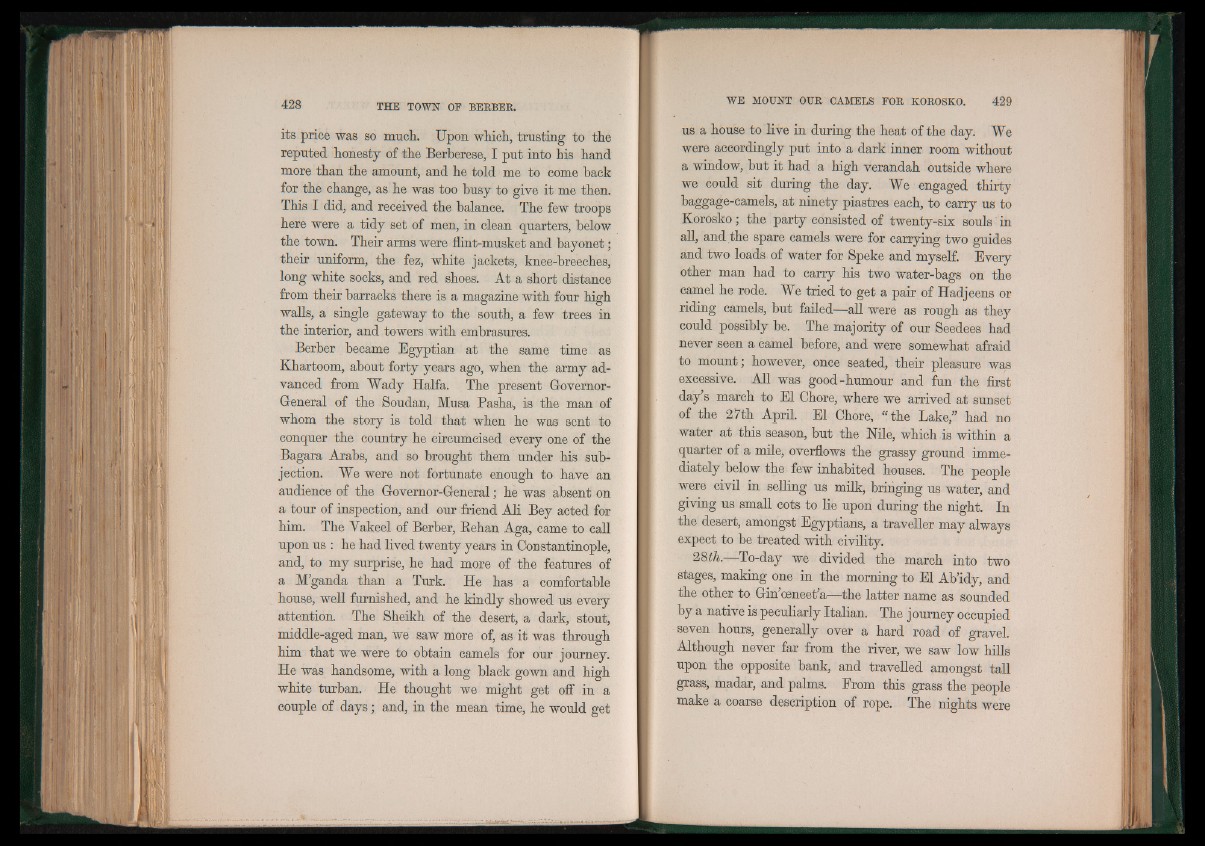
its price was so much. Upon which, trusting to the
reputed honesty of the Berberese, I put into his hand
more than the amount, and he told me to come hack
for the change, as he was too busy to give it me then.
This I did, and received the balance. The few troops
here were a tidy set of men, in clean quarters, below
the town. Their arms were flint-musket and bayonet |
their uniform, the fez, white jackets, knee-breeches,
long white socks, and red shoes. At a short distance
from their barracks there is a magazine with four high
walls, a single gateway to the south, a few trees in
the interior, and towers with embrasures.
Berber became Egyptian at the same time as
Khartoom, about forty years ago, when the army advanced
from Wady Haifa. The present Governor-
General of the Soudan, Musa Pasha, is the •man of
whom the story is told that when he was sent to
conquer the country he circumcised every one of the
Bagara Arabs, and so brought them under his subjection.
We were not fortunate enough to have an
audience of the Governor-General; he was absent on
a tour of inspection, and our friend Ali Bey acted for
him. The Vakeel of Berber, Behan Aga, came to call
upon us : he had lived twenty years in Constantinople,
and, to my surprise, he had more of the features of
a Mganda than a Turk. He has a comfortable
house, well furnished, and he kindly showed us every
attention. The Sheikh of the desert, a dark, stout,
middle-aged man, we saw more of, as it was through
him that we were to obtain camels for our journey.
He was handsome, with a long black gown and high
white turban. He thought we might get off in a
couple of days; and, in the mean time, he would get
us a house to live in during the heat of the day. We
were accordingly put into a dark inner room without
a window, but it had a high verandah outside where
we could sit during the day. We engaged thirty
baggage-camels, at ninety piastres each, to carry us to
Korosko; the party consisted of twenty-six souls ■ in
all, and the spare camels were for carrying two guides
and two loads of water for Speke and myself. Every
other man had to carry his two water-bags on the
camel he rode. We tried to get a pair of Hadjeens or
riding camels, but failed—all were as rough as they
could possibly be. The majority of our Seedees had
never seen a camel before, and were somewhat afraid
to mount; however, once seated, their pleasure was
excessive. All was good-humour and fun the first
day’s march to El Chore, where we arrived at sunset
of the 27th April. El Chore, "the Lake,” had no
water at this season, but the Nile, which is within a
quarter of a mile, overflows the grassy ground immediately
below the few inhabited houses. The people
were civil in selling us milk, bringing us water, and
giving us small cots to lie upon during the night. In
the desert, amongst Egyptians, a traveller may always
expect to be treated with civility.
28th- To-day we divided the march into two
stages, making one in the morning to El Ab’idy, and
the other to Gin’oeneet’a—the latter name as sounded
by a native is peculiarly Italian. The journey occupied
seven hours, generally over a hard road of gravel.
Although never far from the river, we saw low hill«
upon the opposite bank, and travelled amongst tall
grass, madar, and palms. From this grass the people
make a coarse description of rope. The nights were